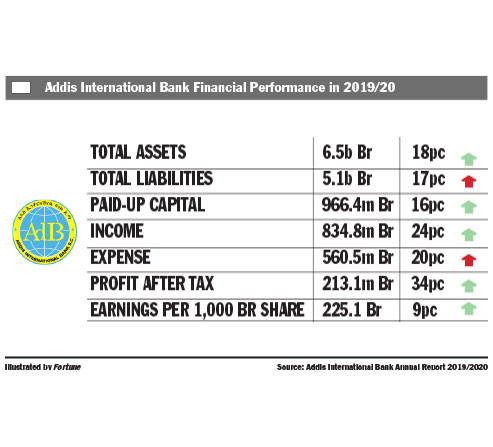
Radar | Dec 16,2023
May 8 , 2021
By BAMLAK FIKADU ( FORTUNE STAFF WRITER
)
Appeals by hotel owners and tour operators for the extension of repayments of loans taken from commercial banks to assuage the severe impact of the COVID-19 pandemic has been rejected by the central bank. Authorities at the National Bank of Ethiopia (NBE) say they have no mandate to extend the repayment period and referred the case to the respective commercial banks.
The hospitality industry remains the hardest hit since the first case of the COVID-19 virus was reported in Ethiopia in March 2020. International visitors disappeared, nosediving hotel occupancy rate below 10pc, and tour operators dependent on international tourists dried up with revenues. Many reached the point where they could not have paid employee salaries.
The central bank responded to pressures from the industry, approving two separate stimulus packages to support the industries, which officially requested 6.6 billion Br in soft loans. Half of this amount was made available through commercial banks in June last year, with an interest rate of five percent. A subsequent 2.7 billion Br, with a lending rate of 5.5pc, followed at the end of last year. However, borrowers under this scheme were given six months to benefit from the package and required to use the loans to cover payrolls and operational expenses. These loans were scheduled to be repaid in a year.
The deadline for repayment is fast approaching, with borrowers now pleading with the central bank for extensions.
Despite welcoming the stimulus package, the Ethiopian Hotel & Service Employers Federation has requested the extension of the loan repayment, asserting that the fate of its members is uncertain, with the hospitality industry bracing for tougher months ahead amid growing concerns over the potentially devastating impacts of the second wave of the pandemic. An industry lobby group, the Federation represents 1,400 hotels and service providers in the hospitality industry.
The National Bank of Ethiopia (NBE) response will not be to the Federation`s liking.
The central bank made the financing available to commercial banks using quota arrangements, depending on the number of clients each has in the hospitality industry. In the first stimulus package, the banks were required to surrender the full amount collected from the five percent interest to the central bank, an amount brought down by one percentage point for the second lending. Authorities at the central bank see their role limited to availing the financing through the banks as a part of their effort to save the industry from collapse. The central bank cannot decide for the banks, which can extend the repayment period based on their own credit policies, according to Fekadu Degfe, vice governor of the central bank.
This will put hotels and others in a similar line of business caught between a rock and a hard place, according to Fiteh Woldesenbet, president of the Federation.
"There's no sign of recovery," he told Fortune. "Things are getting worse as our members keep losing revenues every day with no end in sight. It would be naive to expect the repayment period to end within a year under such conditions."
The industry wants to have at least three years to repay the loans, according to Fiteh.
Owners of hotels and businesses in the hospitality industry have been complaining that commercial banks are only availing 25pc of the loans authorised by the central bank, a tactical measure to discourage the use of the soft loans for purposes other than covering operational expenses, including covering payrolls.
The tourism industry, which accounts for an estimated nine percent of Ethiopia's GDP and supports over two million jobs, has been hit especially hard by the pandemic, which has pushed countries to enforce lockdowns, close airports, and prevents their citizens from travelling abroad. According to the Ministry of Culture & Tourism, the last fiscal year alone saw the country's tourism proceeds fall by at least one billion Birr, according to the Ministry of Culture & Tourism.
The global hospitality market experienced a 4.7-trillion-dollar loss last year, slashing its contribution to the world's GDP by 49pc and leading to the loss of 62 million jobs, the annual Economic Impact Report (EIR) published last month by the World Travel & Tourism Council (WTTC) revealed. Likewise, the growth of the market in Ethiopia, represented as economic activities carried out by hotels and restaurants, has fallen from nine percent to 2.2pc.
"We're struggling to pay salaries for our employees, let alone repay our loans," said Birhan Tedla, owner of Oasis International Hotel. "Some actions taken by the NBE made me wonder whether the government really understands our current situation."
He is not particularly pleased with the news of the central bank pushing commercial banks to beef up their paid-up capital instead of extending the repayment period for his industry and further make the loans affordable by reducing the lending rate.
Mulugeta Biyazen, property owner of Homeland Hotel and president of the Bahir Dar Hotel Owners' Association, shares Birhan`s view that the industry is far off from quick recovery.
"Considering the global trend and what has been unfolding in the country, the hospitality industry requires more assistance," Birhan told Fortune. "But this is unlikely to happen with hotels not benefiting from the already-approved financial package due to the absence of strong follow-up."
He sees banks in Bahir Dar treating the soft loans like any other short-term loan, with "unnecessary" preconditions put in place by the central bank that has offered a window of opportunity for the banks to make the loan appraisal process lengthy.
The Vice Governor begs to differ, stating that the preconditions in place are standard.
"Any business affected by the pandemic has the right to benefit from the stimulus package. However, it hasn't been utilised as we had hoped," he told Fortune.
PUBLISHED ON
May 08,2021 [ VOL
22 , NO
1097]

Radar | Dec 16,2023

Fortune News | Apr 03,2021

Fortune News | Apr 06,2024

Fortune News | Jul 18,2020

Radar | May 31,2025

Dec 22 , 2024 . By TIZITA SHEWAFERAW
Charged with transforming colossal state-owned enterprises into modern and competitiv...

Aug 18 , 2024 . By AKSAH ITALO
Although predictable Yonas Zerihun's job in the ride-hailing service is not immune to...

Jul 28 , 2024 . By TIZITA SHEWAFERAW
Unhabitual, perhaps too many, Samuel Gebreyohannes, 38, used to occasionally enjoy a couple of beers at breakfast. However, he recently swit...

Jul 13 , 2024 . By AKSAH ITALO
Investors who rely on tractors, trucks, and field vehicles for commuting, transporting commodities, and f...

Oct 18 , 2025
The political establishment, notably the ruling party and its top brass, has become p...

Oct 11 , 2025
Ladislas Farago, a roving Associated Press (AP) correspondent, arrived in Ethiopia in...

Oct 4 , 2025
Eyob Tekalegn (PhD) had been in the Governor's chair for only weeks when, on Septembe...

Sep 27 , 2025
Four years into an experiment with “shock therapy” in education, the national moo...